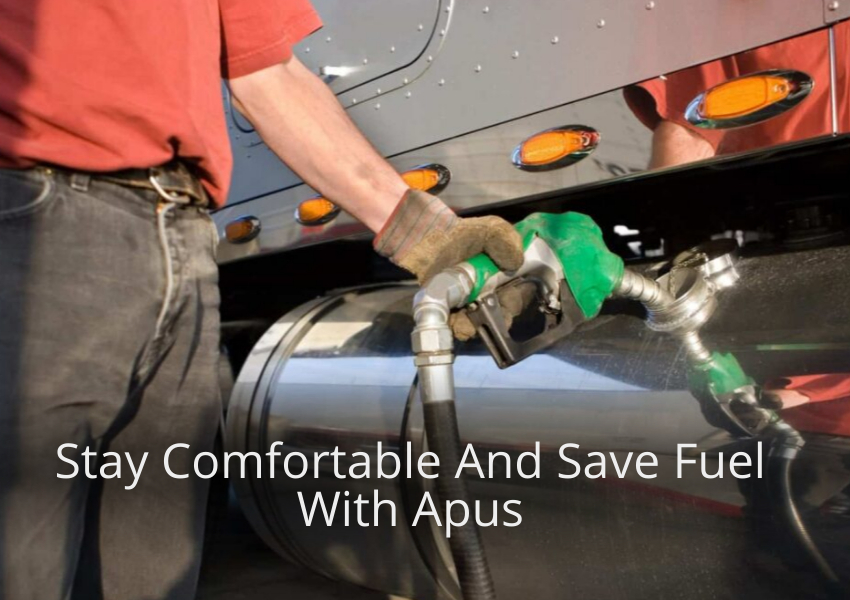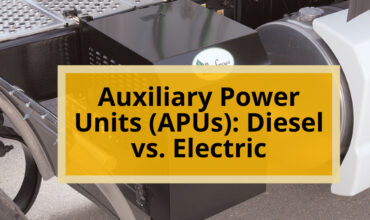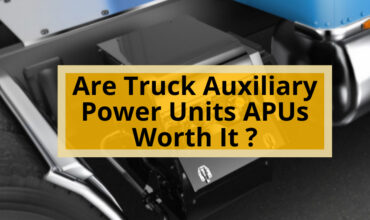Long-haul truckers face the challenge of maintaining a comfortable temperature in their semi-trucks while avoiding idling their engines. This not only wastes fuel but may also result in fines in some states. The solution to this problem lies in Auxiliary Power Units (APUs).
APUs are small engines that provide electrical power and heating or cooling to the cabin of a truck while the main engine is turned off. There are two types of APUs: combustion and electric. Combustion APUs run on fuel and require more maintenance, while electric APUs run on battery power and require less maintenance.
Both types of APUs offer benefits to truckers, including fuel savings, reduced emissions, and increased comfort while on the road. In this article, we will delve into the benefits of APUs and how they can help truckers comply with no-idling laws while staying comfortable on the road.

Types of APUs
The discussion of auxiliary power units (APUs) for long-haul truckers is incomplete without an examination of the two types available, combustion and electric, each with its own advantages and disadvantages.
Combustion APUs run on fuel and have higher power output than electric APUs. They are capable of generating more power at once and can run for a longer time. However, they require more maintenance and can be more costly to operate. Fuel efficiency is also a concern, as combustion APUs consume more fuel and emit more pollutants.
On the other hand, electric APUs run on battery power and require less maintenance. They are more fuel-efficient compared to combustion APUs, resulting in lower operating costs and reduced emissions. However, they have a shorter run time and may not be able to generate as much power as combustion APUs.
Despite this, electric APUs are a popular choice among truckers due to their lower maintenance and fuel costs. Ultimately, the choice between combustion and electric APUs depends on the specific needs and priorities of the long-haul trucker.
also read : Stay Safe: Portable Generator Grounding Guidelines
Benefits of APUs
One advantage of utilizing auxiliary power units (APUs) in long-haul trucks is the ability to maintain a desired temperature in the cab without the need for idling the engine. This not only improves the comfort of the driver but also saves fuel and reduces the emission of harmful pollutants. APUs allow the driver to turn off the engine during rest periods or breaks while still maintaining a comfortable temperature inside the cab. This saves fuel and reduces the wear and tear on the engine, leading to lower maintenance costs and longer engine life. APUs also help truckers comply with no-idling laws in some states and reduce the risk of fines and penalties.
In addition to fuel efficiency and compliance with no idling laws, APUs offer other benefits to long-haul truckers. They allow small electronics, such as laptops and refrigerators, to run even when the engine is off. This not only improves the comfort of the driver but also increases productivity and reduces downtime.
APUs also provide a more reliable source of power than relying on the truck’s battery alone. This is especially important for truckers who spend weeks at a time on the road and rely on their semi-trucks as their homes away from home. Overall, APUs are a valuable investment for long-haul truckers, offering improved comfort, fuel efficiency, compliance with regulations, and increased productivity.
Also read : Power Up Your Truck With The Best Apus
Maintenance and Costs
Maintaining the optimal performance of auxiliary power units (APUs) for long-haul trucks requires regular servicing and upkeep, much like a well-tuned instrument needs regular tuning to produce beautiful music.
To ensure that APUs continue to run efficiently while reducing maintenance costs, truckers and fleet managers should keep the following tips and tricks in mind:
- Regularly inspect and clean the air intake system to prevent dust and debris from clogging the system and causing engine damage.
- Change the oil and oil filter every 500 hours of operation to maintain engine performance and reduce wear and tear on the unit.
- Keep the APU’s battery properly charged to avoid shortening its lifespan and requiring frequent replacements.
- Check the coolant level regularly and replace it every two years to prevent corrosion and extend the life of the engine.
- Invest in high-quality components and filters to reduce the risk of breakdowns and ensure optimal performance.
By following these maintenance practices, truckers and fleet managers can reduce the frequency and cost of repairs to APUs while ensuring that they continue to provide reliable heating, cooling, and power for long-haul truckers.
Frequently Asked Questions
Are there any safety concerns associated with using APUs?
Fuel efficiency and environmental impact are the main concerns associated with using APUs. Combustion APUs emit pollutants and require more fuel, while electric APUs have a smaller carbon footprint and consume less fuel. Proper maintenance is necessary to ensure safe operation.
Can APUs be installed on any type of semi-truck, or are there specific requirements?
The APU installation process and compatibility with different truck models can vary depending on the type of APU. Factors such as truck model, engine type, and available space must be considered when selecting and installing an APU.
How long do electric APUs typically last before needing to be replaced?
The lifespan of electric APUs varies depending on usage and maintenance requirements. Typically, they can last between 3-5 years before needing replacement. Compared to combustion APUs, electric APUs require less maintenance and have a shorter run time.
Do APUs affect the overall performance or power of the semi-truck?
APUs do not affect the overall performance or power of the semi-truck. Instead, they provide fuel efficiency benefits by reducing idling time and complying with no-idling laws, resulting in a positive environmental impact.
Are there any tax incentives or rebates available for trucking companies that invest in APUs?
According to the US Department of Energy, there are federal tax incentives available for companies that invest in idle reduction technologies, including APUs. The incentives can range from $1,000 to $4,000 per unit, providing significant financial benefits for trucking companies.






